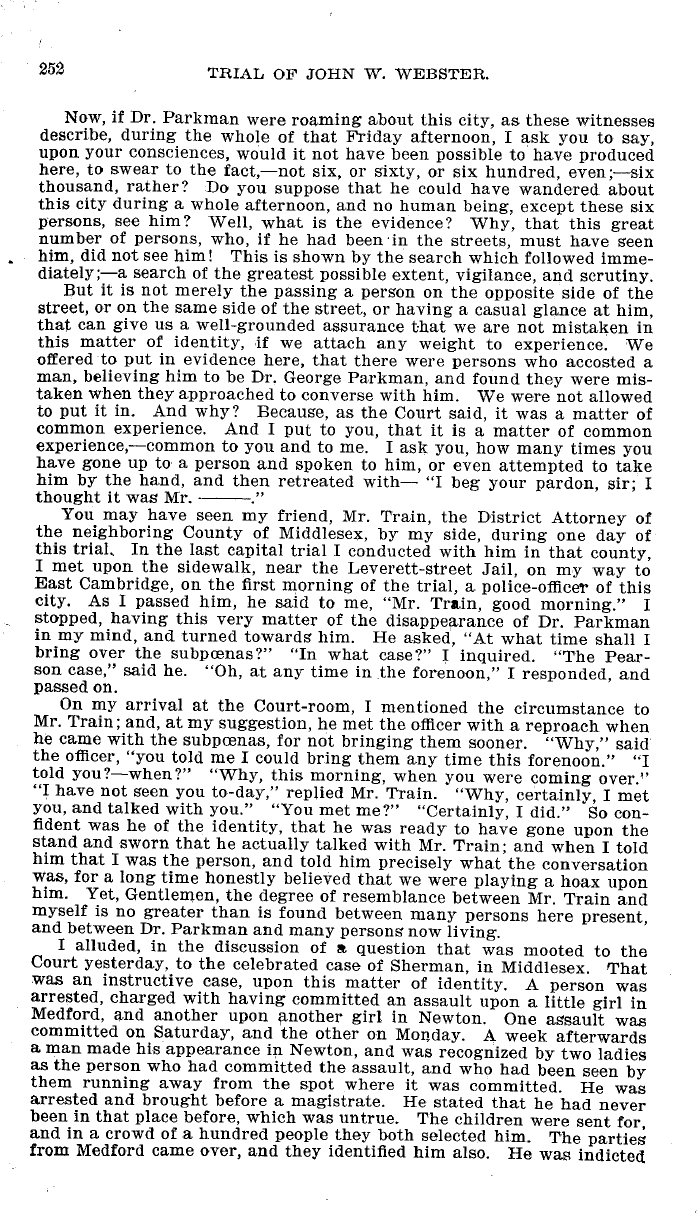|
252 TRIAL OF JOHN W. WEBSTER.
Now, if Dr. Parkman were roaming about this city, as these witnesses
describe,
during the whole of that Friday afternoon, I ask you to say, upon your
consciences,
would it not have been possible to have produced here, to swear to the
fact,-not
six, or sixty, or six hundred, even; six thousand, rather? Do you suppose
that he
could have wandered about this city during a whole afternoon, and no human
being,
except these six persons, see him? Well, what is the evidence? Why, that
this great
number of persons, who, if he had been in the streets, must have seen him,
did not
see him! This is shown by the search which followed immediately; a search
of the
greatest possible extent, vigilance, and scrutiny.
But it is not merely the passing a person on the opposite side of the
street, or
on the same side of the street, or having a casual glance at him, that can
give us a
well-grounded assurance that we are not mistaken in this matter of
identity, if we
attach any weight to experience. We offered to put in evidence here, that
there
were persons who accosted a man, believing him to be Dr. George Parkman, and
found they were mistaken when they approached to converse with him. We were
not allowed to put it in. And why? Because, as the Court said, it was a
matter of
common experience. And I put to you, that it is a matter of common
experience,-
common to you and to me. I ask you, how many times you have gone up to a
person and spoken to him, or even attempted to take him by the hand, and
then
retreated with- "I beg your pardon, sir; I thought it was Mr.
You may have seen my friend, Mr. Train, the District Attorney of the
neighboring County of Middlesex, by my side, during one day of this trial,
In the
last capital trial I conducted with him in that county, I met upon the
sidewalk, near
the Leverett-street Jail, on my way to East Cambridge, on the first morning
of the
trial, a police-officer of this city. As I passed him, he said to me, "Mr.
Train, good
morning." I stopped, having this very matter of the disappearance of Dr.
Parkman
in my mind, and turned towards him. He asked, "At what time shall I bring
over the
subpoenas?" "In what case?" I inquired. "The Pearson case," said he. "Oh,
at any
time in the forenoon," I responded, and passed on.
On my arrival at the Court-room, I mentioned the circumstance to Mr. Train;
and at my suggestion, he met the officer with a reproach when he came with
the
subpoenas, for not bringing them sooner. "Why," said the officer, "you told
me I
could bring them any time this forenoon." "I told you?-when?" "Why, this
morning, when you were coming over." "I have not seen you to-day," replied
Mr.
Train. "Why, certainly, I met you, and talked with you." "You met me?"
"Certainly, I did." So confident was he of the identity, that he was ready
to have
gone upon the stand and sworn that he actually talked with Mr. Train; and
when I
told him that I was the person, and told him precisely what the
conversation was,
for a long time honestly believed that we were playing a hoax upon him. Yet,
Gentlemen, the degree of resemblance between Mr. Train and myself is no
greater
than is found between many persons here present, and between Dr. Parkman and
many persons now living.
I alluded, in the discussion of as question that was mooted to the Court
yesterday, to the celebrated case of Sherman, in Middlesex. That was an
instructive
case, upon this matter of identity. A person was arrested, charged with
having
committed an assault upon a little girl in Medford, and another upon
another girl in
Newton. One assault was committed on Saturday, and the other on Monday. A
week afterwards a man made his appearance in Newton, and was recognized by
two
ladies as the person who had committed the assault, and who had been seen by
them running away from the spot where it was committed. He was arrested and
brought before a magistrate. He stated that he had never been in that place
before
which was untrue. The children were sent for, and in a crowd of a hundred
people
they both selected him. The parties from Medford came over, and they
identified him also. He was indicted
|

